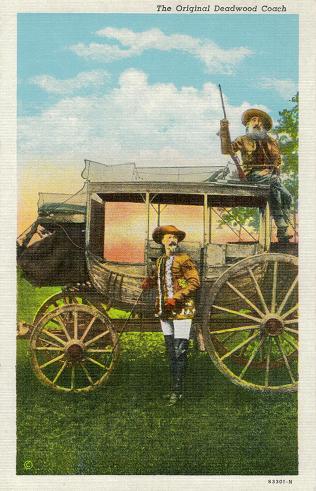

| Home Links Contact |
| 1887-88 1891-92 1892 1902-03 1904 |
|
|
The show returned as Buffalo Billís Wild West and Congress of Rough Riders of the World during the 1903 tour of England and Wales. On this occasion there were either eight or nine Welsh venues, depending on whether Newport is accounted as English or Welsh. Rhyl, Bangor and Ruabon each received a visit for one day only at the end of May; a number of English venues intervened before Abergavenny, Aberdare, Cardiff, Llanelly, Swansea and Newport occupied most of the first half of July. All were for one day only, excepting Cardiff (Monday, 6th - Saturday, 11th) and Swansea (Tuesday, 14th & Wednesday 15th).

Buffalo Billís Wild West first visited Wales when, from Monday, 21st September, to Saturday, 26th, Sophia Gardens Park, Cardiff, was a venue on the 1891 tour. Buffalo Bill, suffering from a severe cold, arrived by train from Birmingham at around 10.30 on Monday morning and was escorted through the streets of the city by a detachment from his company. At 11.00, a mounted street procession set out from the venue.
People flocked from all over Wales and Buffalo Bill was so delighted with the record-breaking crowds, massive takings and his general impression of the local people that he gave a pound (then a substantial sum of money) to every charity which approached him there. Annie Oakley donated two pounds to the Cardiff Infirmary.
For Nate Salsbury, Colonel Codyís business partner, who traced his ancestry to Welsh emigrants, it was in the nature of a homecoming.
Meanwhile, the Indians took to the nearby River Taff, preferring this mode of bathing to the showís mobile facilities.
Cardiff was the only Welsh venue on the tour but, by way of compensation, Swansea would receive a visit from Miss Viola Clemmonsís White Lily company in the week commencing Monday, 16th November 1891.
The postcard, left, depicting Buffalo Bill in front of the Deadwood Stage, John Y. Nelson riding shotgun, is based upon a photograph taken by Goldie Bros of Cardiff during September 1891. In the original, four gentlemen, understood to be the Marquess of Bute, the proprietor of the venue, with other local dignitaries, are seated in the coach, whilst four others peer through the windows from behind. For reasons no doubt pertaining to artistic discretion, the producers of the postcard edited these figures out.Film footage of Colonel Cody arriving at and leaving the Lorne Hotel, Market Street, Rhyl, on Wednesday, 27th May 1903, for his initiation into the Royal Antediluvian Order of Buffaloes, a quasi-Masonic organisation for members of the theatrical profession, is available to view online. His involvement was apparently ongoing as he was subsequently elected as member no. 804 of the Clan Ord Lodge at Inverness, Scotland, on Saturday, 3rd September 1904.
Ruabon was a last-minute stand-in for Chester, where the shows were cancelled owing to a local outbreak of smallpox.
Wherever the Wild West travelled, Buffalo Billís publicity man, ĎMajorí John M. Burke, strove to establish common ground with the local people. In an interview with the Cardiff Mail, 11th July 1903, he breathed fresh life into the enduring legend of Prince Madoc, said to have sailed from Wales with ten ships in the early 14th century and to have established a colony in North America, leaving a genetic and linguistic mark on the Mandan tribe of the Dakotas.
An even more sustained campaign followed on the Welsh leg of the 1904 tour of Great Britain, consisting of no fewer than fifteen venues, taking up the greater part of May. These were Llandudno, Holyhead, Carnarvon, Portmadoc, Dolgelley, Aberystwyth (Chester, England, intervening here), Wrexham (Oswestry, England, intervening here), Builth Wells, Carmarthen, Pembroke Dock, Llanelly, Neath, Bridgend, Barry Dock and Cardiff. Once again, these were for one day only, with the sole exception of Cardiff (Friday, 20th and Saturday, 21st, thus earning the city the distinction of being Buffalo Billís first and last ever port of call in Wales.
A photograph, presumably dating to the 1904 tour, is held by the Conwy Archives of two Indians, in bed in Llandudno Cottage Hospital. Three ladies, apparently the Matron and two nurses, are also included in the image. The Indians have been provisionally identified as William Sitting Bull, youngest son of the famous chief, and Jonas Spider; both of whom were sent back to America at the end of May, suffering from lung conditions.
Buffalo Bill left a rather unusual legacy in Builth Wells, where a local legend in circulation for well over a century insisted that the billboards advertising the show, therefore no longer required after its departure, had been put to another use, forming the floor of the Drill Hall, constructed in July 1904. The hall underwent various changes of use over the ensuing decades, until the truth behind the rumours was finally and conclusively established. In the course of renovation work in 2016, the entire floor was lifted, revealing tattered poster fragments on the underside, some still firmly attached. The Builth Wells and District Heritage Society was able to retrieve and preserve some of these but arranging them in the correct order has proven to be something of a challenge.
Dates & Venues, 1891-92